
Role of the youth in international partnerships: the case of Ukraine and youth participation in reconstruction efforts
Source: Capacity4dev
24 February this year marked the second anniversary of the escalation of the war that is devastating the lives of millions. Recent data shows that about 3.7 million people have been internally displaced, and more than 6 million are displaced abroad. Of these more than 10 million, the Ministry of Youth in Ukraine estimated that over 4 million are young people. “[They] are often at the forefront of the humanitarian response to natural disasters, political upheaval, and armed conflicts. The war in Ukraine is yet another horrific example of an event that has caused a devastating impact on people’s lives, yet motivated young people to help others.” (ActionAid International, 2022)
Because they are among the most affected sections of the population, it only makes sense their place at the decision-making table should be a high priority on the agenda for the future of the country.
Encouraging youth participation in reconstruction and recovery efforts
Youth engagement and protection, along with providing mental health and psychosocial support, education, and gender-transformative crisis response, are just a few of the priorities Plan International’s Ukraine Crisis Response has been addressing since August 2022. The organisation has been working as part of broader regional efforts that also include programmes in Moldova, Poland and Romania.
Plan International has intentionally positioned itself as a dual mandate organisation. “We focus on life-saving humanitarian action, but also on providing sustainable and systemic solutions to issues affecting children and young people,” explains Sven Coppens, Director of Plan International’s Ukraine Response. One of the most important ways to guarantee that impact is sustainable in the long term and that it leads to a better future for Ukraine is prioritising youth involvement in decision-making.
“Youth involvement happens, first of all, at the local level,” says Stefan Schleuning, Head of Cooperation at the Delegation of the European Union to Ukraine in Kyiv. “One of our flagship programmes, EU4Recovery, implemented together with the United Nations Development Programme (UNDP), has succeeded in systematically involving young people at the community level in planning project activities, zooming in on key areas like mental health, employment opportunities, and the reintegration of veterans. We need to make sure that decision-making governance mechanisms are truly inclusive.”
The European Commission Directorate-General for International Partnerships (DG INTPA) is playing a crucial role in fostering meaningful participation in policy making of younger generations worldwide. The Youth Action Plan’s main priority is to “shape external action in partnership with young people, to ensure their ownership and thus accelerate progress towards the 2030 Agenda for Sustainable Development and other international commitments.” The first pillar of the plan is partnership to engage by increasing young people’s voices in policy and decision-making.
In addition, the EU4Youth programme is another fundamental initiative financed by the European Union and implemented by GIZ. It focuses on youth engagement and empowerment in Eastern Partnership’s countries, namely Armenia, Azerbaijan, Belarus, Georgia, Moldova and Ukraine.
Tips on how to be more youth-inclusive in decision-making:
- Let young people be the agents of change.
- Let young people shape and drive the agenda.
- Let young people have their rightful place at the table.
Let young people be the agents of change
“Suddenly, and very quickly, we had to become adults,” says Anastasiia Pasalska, a young activist from Ukraine, when asked about the challenges young Ukrainians have been facing since the outbreak of the war. “We need to be responsible, young adults. There is so much pressure for the future… if unable to go to university because many of the buildings are now occupied or have been destroyed, young boys aged 18 must go to the front line. Many have lost their homes and have nowhere to go.”
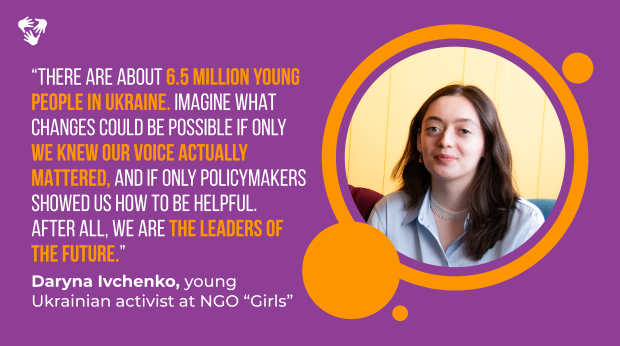
The losses have been unbearable, especially for younger generations who have had to deal with the unthinkable situation of not being able to go to school or find a job and plan for their future. “They have lost their social circles, and they have to re-learn how to socialise again. This has a huge impact on their mental health,” explains Daryna Ivchenko, another young activist from Ukraine who works at NGO “Girls” that our team interviewed. “Currently, almost every Ukrainian child is expected to have, or already shows, signs of post-traumatic stress disorder.”
Addressing these needs, from psychosocial support to education, but particularly tackling the obstacles that hinder their involvement in decision-making, must be prioritised.
Data collected by UNDP show that a mere 1% of young Ukrainians feel included in reconstruction efforts, with about 72% willing to contribute actively if given the chance. Much more can be done at the local and institutional level to take advantage of the exclusive perspective young people can offer. At the end of the day, they have a vested interest in rebuilding a safer and more peaceful society.
Let young people be the agents of change
Youth participation will be vital if we want to successfully rebuild Ukraine. Too often, young voices are not placed at the forefront of reconstruction efforts. Worryingly, a wide array of solutions and initiatives remain untapped.
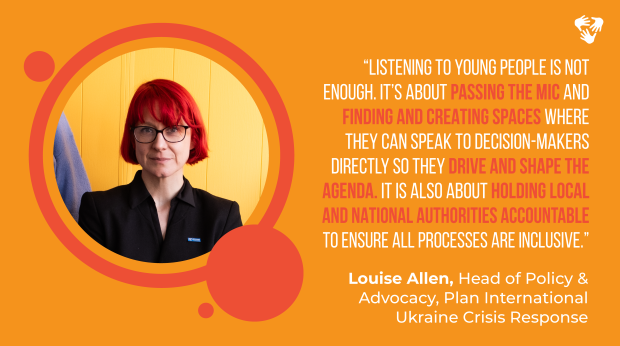
“From our own consultations with over 200 young people impacted by the war in Ukraine,” explains Sven Coppens, Director of Plan International’s Ukraine Crisis Response, “there is a clear desire from the youth to be actively involved in the country’s reconstruction. There is an eagerness to push for positive change and to fill the reform gap based on a vision of what Ukraine after the war should look like and on new, innovative solutions for the future of their country.”
In addition to guaranteeing that youth civil engagement is kept at the top of the agenda, there is a widespread need to make it as systematic and inclusive as possible so that the needs of marginalised sections of society are a priority. “There’s a diversity among young people that will create an environment for innovation and impact,” concludes Sven Coppens.
Let young people take their rightful seat at the table
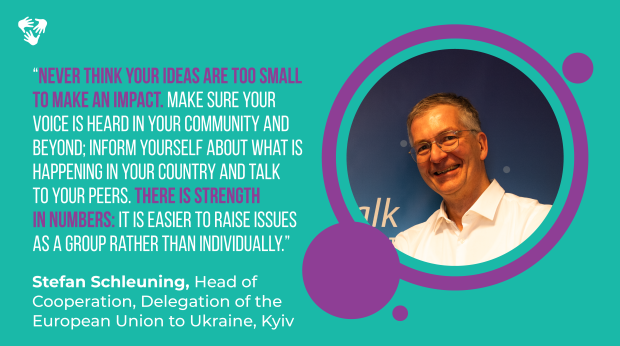
Return to normal life is not impossible in Ukraine. Together with many other international donors, the EU continued supporting the country since the very beginning of the conflict. Specifically, to help in its recovery and reconstruction efforts, the Ukraine Facility was created to provide the country with up to €50 billion in stable and predictable financial support. Young people are ready to do their part. Still, their seat at the decision-making table cannot just be ad hoc: “Young people’s voices matter, their perspective, and insights on how to deal with reconstruction matter. It’s not enough just to invite them to the table: young people have a right to be there,” says Sven Coppens.
A vested interest in a peaceful future
A shift in mindset at the policy level needs to happen if we hope for a peaceful transition to stability and security in Ukraine: “When the war is over, young people from Ukraine will be essential to Ukraine’s reconstruction and recovery. Not only will they contribute to the country’s economic recovery and workforce that will physically rebuild damaged or destroyed infrastructure, their decisions on whether to return to Ukraine or where they used to live if internally displaced will directly impact the overall success of reintegration and post-conflict development plans.” (ActionAid International, 2022)
Acknowledging the role that young people play is the first step towards recognising that Ukraine’s reconstruction and recovery will depend not only on financial support but also on the pivotal contribution that young Ukrainians are more than willing to make to their future.
MOST READ
RELATED

EU4Culture: Practical online course on successful grant proposal writing
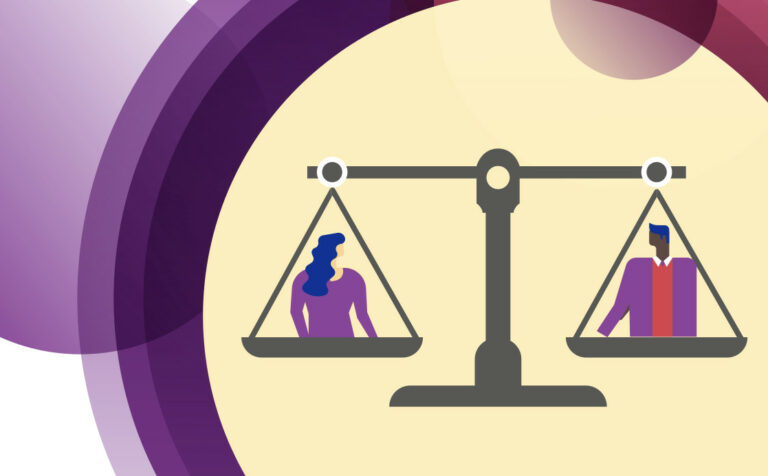
Armenia Country Gender Profile
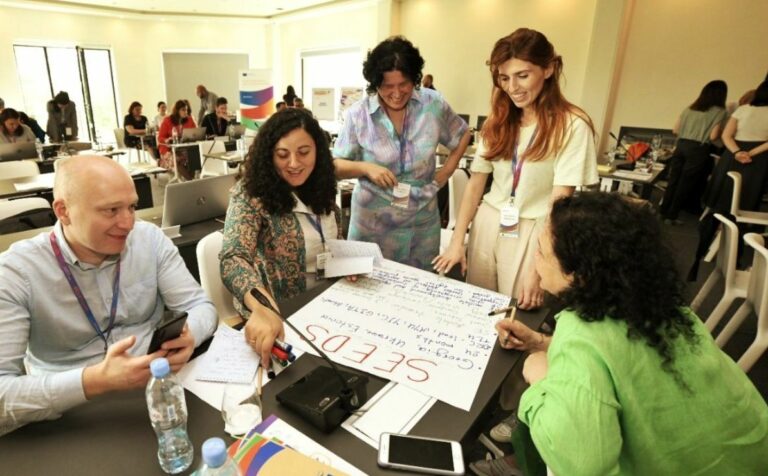
EU4Youth Newsletter: Welcome to the EU4Youth Stakeholder Hub!
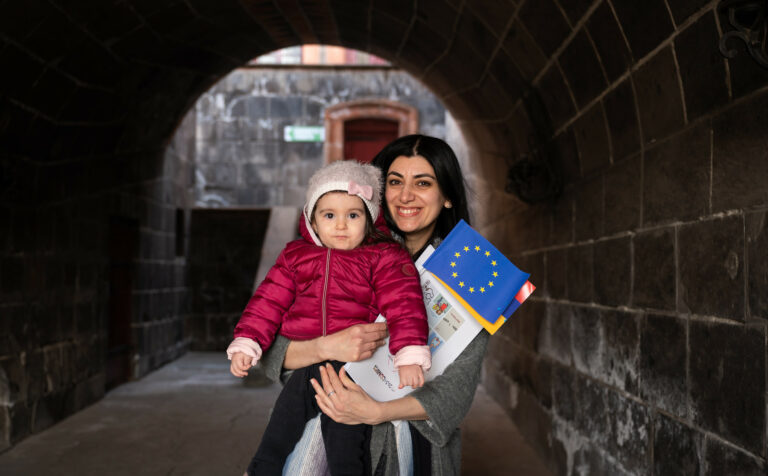
A Resilience and Growth Plan for Armenia
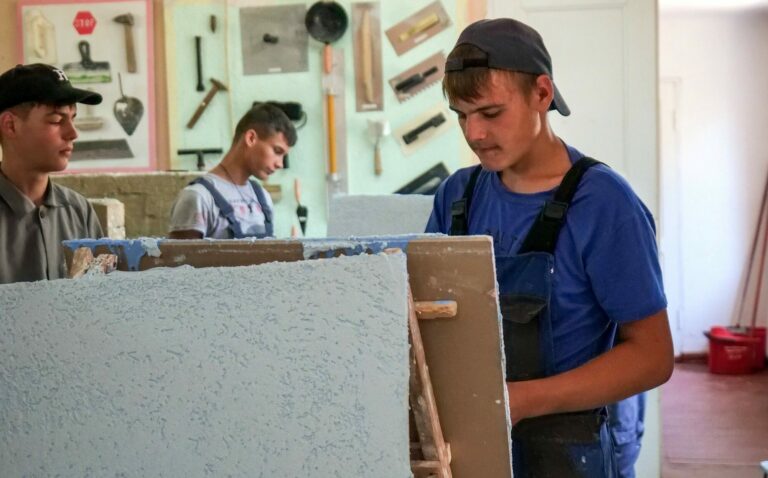
EU4Youth develops Youth Wiki reports on Youth Employment and Employability
More campaign pages:
Interested in the latest news and opportunities?
This website is managed by the EU-funded Regional Communication Programme for the Eastern Neighbourhood ('EU NEIGHBOURS east’), which complements and supports the communication of the Delegations of the European Union in the Eastern partner countries, and works under the guidance of the European Commission’s Directorate-General for Neighbourhood Policy and Enlargement Negotiations, and the European External Action Service. EU NEIGHBOURS east is implemented by a GOPA PACE-led consortium. It is part of the larger Neighbourhood Communication Programme (2020-2024) for the EU's Eastern and Southern Neighbourhood, which also includes 'EU NEIGHBOURS south’ project that runs the EU Neighbours portal.

The information on this site is subject to a Disclaimer and Protection of personal data. © European Union,







